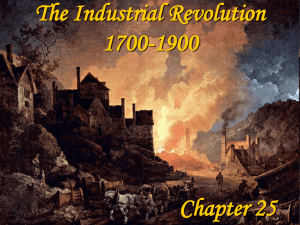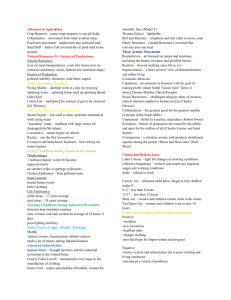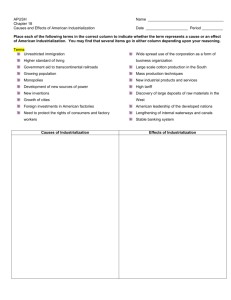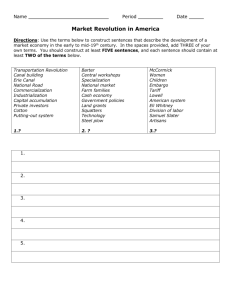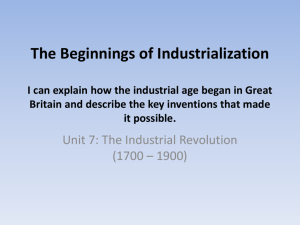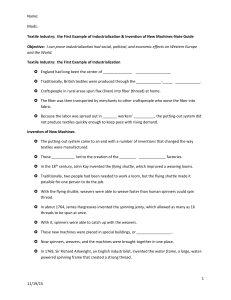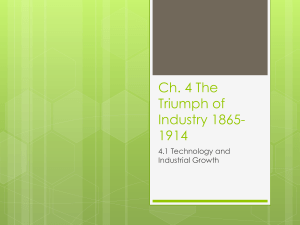Industrialization
advertisement
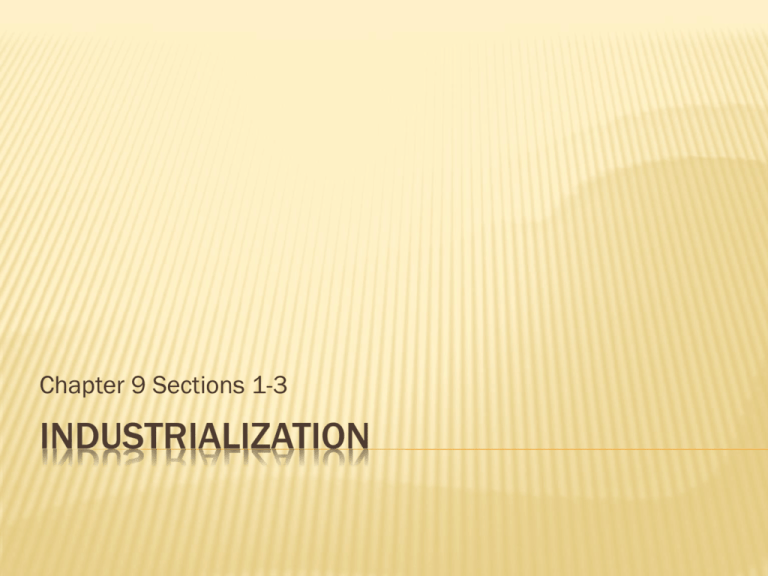
Chapter 9 Sections 1-3 INDUSTRIALIZATION INDUSTRIAL REVOLUTION The greatly increased output of machine-made goods that began in Enlgand in the middle 1700s. INDUSTRIAL REVOLUTION BEGINS IN BRITAIN Wealthy people buy up land then come up with new ways to farm Enclosures- larger fields with fences or hedges Scientific Farmers- new planting methods boost production Crop Rotation and new breeding methods People tenant farmers or move to cities More food=more people= more demand for goods Why England? Industrialization- the process of developing machine production of goods. = need for resources Britain has resources, good economy, highly developed banking system, political stability, and all of the factors of production. (land, labor, capital, and wealth) INVENTIONS SPUR INDUSTRIALIZATION John Kay’s Flying Shuttle- doubles work of weaver James Hargreaves- Spinning Jenny- Spins 8 threads at a time Richard Arkwright- Water Frame water powered spinning wheels Samuel Crompton- Spinning Mule Edmund Cartwright- power loom Eli Whitney- The Cotton Gin SPINNING JENNY IMPROVEMENTS IN TRANSPORTATION Watt’s Steam Engine Watt mathematical instrument maker teams up with Matthew Boulton and entrepreneur in 1774 Found ways to make steam engines faster, more efficient, and burn less fuel Water Transportation Steam powered boats= transport faster Road Transportation John McAdam- New roads with large rock on bottom and small rock on top Turnpikes. THE RAILWAY AGE BEGINS Steam Driven Locomotives The Liverpool-Manchester Railroad Worlds first RR line- Stephenson 1821 27 miles from Yorkshire to Liverpool Held competition to see what locomotive they would use 13 ton load at 24 MPH Railroads revolutionize life in Britain 1. Cheap transporation= industrial growth 2. new jobs 3. boosts ag and fishing industries 4. Travel “THE ROCKET” Section 2 THE EFFECTS OF INDUSTRIALIZATION INDUSTRIALIZATION CHANGES LIVE People move to cities for jobs Living Conditions Urban centers double to quadruple Urbanization- city building and the movement of people to cities Since cities expanded rapidly there were no development plans, sanitary codes, or building codes. Lacked housing, education, and police protection No drains, garbage heaps, Dark dirty shelters, 1 room per family, disease spread rapidly Life span- 17 years city, 38 in rural areas Working Conditions 14 hour days 6 days a week. Dark, dirty, machines dangerous, no safety net Women and children work as much but paid less CLASS TENSIONS GROW Middle Class Skilled workers, professionals, business people, and wealthy farmers Most of new wealth went to these people Eventually division between upper middle and lower middle class Working Class Laborers Destroy machines that take their jobs Riots because of poor living and working conditions POSITIVE EFFECTS OF INDUSTRIAL REVOLUTION Created jobs Fostered technological progress and invention Increased production of goods and standard of living Healthier diets Cheaper goods Expanded educational opportunities for clerical workers and engineers. Economic success of the country http://www.history.com/videos/the-industrial-revolition Chapter 9 Section 3 INDUSTRIALIZATION SPREADS CONTINENTAL EUROPE INDUSTRIALIZES Napoleonic Wars slow things down for the rest of Europe but Industrialism eventually spreads there Belgium Led Europe in adopting new technology Rich in iron, coal, and waterways Helped by British skilled workers William Cockerill smuggles plans to Europe there and builds and enormous enterprise CONTINENTAL EUROPE INDUSTRIALIZES Germany Germany divided so pockets of industrialization appear Import British equipment and engineers Railroads help Germany become an industrial power- helps them become a military power as well Expansion Elsewhere Other places had specific things they produced Ex. Bohemia= spinning industry, Spain(Catalonia)= cotton, Northern Italy= spinning silk France-More measured and controlled, kept a strong agricultural sector = avoided many social and economic problems of industrialization Spain and Austria have hard time industrializing because of geographical obstacles THE IMPACT OF INDUSTRIALIZATION Rise of Global inequality Widened the wealth gap between people and nations Needed raw materials and markets= poor countries Imperialism Transformation of society Revolutionizes every aspect of society from daily life to life expectancy.
